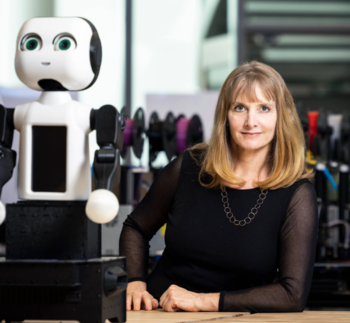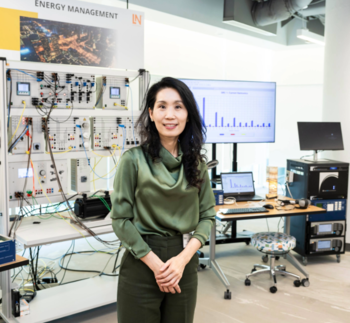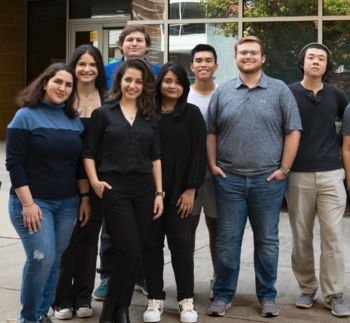In This Story
In response to the evolving demands of the engineering industry, George Mason University's College of Engineering and Computing is launching four new graduate certificate programs, offering specialized training in burgeoning areas within mechanical engineering, electrical and computer engineering, systems engineering and operations research, and computer science. These programs will equip students with the skills and expertise needed to excel in tomorrow’s job market.
Responsible Artificial Intelligence Graduate Certificate
Under the guidance of Missy Cummings, a professor and the director of the Mason Autonomy and Robotics Center (MARC), the Responsible Artificial Intelligence Graduate Certificate program addresses the pressing need for thoughtful AI integration into various industries.

“With the rise of large language models like ChatGPT, there is a critical need for companies to develop strategies for effectively and safely integrating AI into their systems. The Mason approach to Responsible AI emphasizes both rigorous technical and sociotechnical approaches to identifying and mitigating AI risks while achieving value-added outcomes,” said Cummings.
Ideal candidates for this certificate program are “people responsible for ensuring the safe and efficacious adoption of AI into their companies or agencies who want to develop and update their skills to understand the design, testing, and implementation of cutting-edge technology,” she added.
Cummings especially looks forward to teaching the AI Design and Deployment Risks class, she said, “because we analyze current and pressing issues surrounding the risks of deploying AI. The combination of theory and practice is critical to understanding these issues, as well as developing the technology and policy mitigations needed to ensure safe and efficacious AI.”
Microfabrication Graduate Certificate
Led by assistant professor Pei Dong, the Microfabrication Graduate Certificate program addresses the growing demand for multidisciplinary training in the manufacturing sector. With a focus on practical training opportunities facilitated by Mason's new cleanroom facility, this program prepares students for rewarding careers filling societal needs and industry demands.

“Mason has demonstrated extensive expertise in this field for an extended period,” said Dong. “The new research facility now offers hands-on training opportunities for students, marking an exciting development. We believe the timing is perfect to launch the program.”
While the program is designed to benefit Mason graduate students in engineering and science, Dong noted, those with a bachelor’s in a STEM field from outside of the university can also enroll.
“I am thrilled about the four courses currently available to students,” said Dong. “The tremendous support from the Mechanical Engineering Department, Electrical and Computer Engineering Department, the Physics and Astronomy Department and the cleanroom team, ensure that these courses offer comprehensive training from both engineering and science perspectives.”
Smart Grid Technology Graduate Certificate
Associate professor Liling Huang spearheaded the creation of the Smart Grid Technology Graduate Certificate program for engineers interested in modernizing power grids with sustainability goals in mind.

“The need for this program was identified through extensive market research and engaging with industry experts,” explained Huang. “We recognized a growing demand for professionals skilled in smart grid technology, driven by the imperative of modernizing power grids and meeting sustainability goals. The demand for smart grid technology is expected to continue growing, making it an exciting field for professionals to pursue.”
Ideal for professionals in the utility and energy sectors, this program offers comprehensive training in smart grid technology, addressing critical societal and economic issues such as energy sustainability and grid resilience.
Passionate about teaching power and energy courses, Huang is particularly excited about teaching ECE 518 Power System Protection and Control. She said that the contents of that course are “paramount in ensuring the reliability and stability of the energy infrastructure.
“This course incorporates hands-on experiments supported by the cutting-edge facilities in the Smart Grid Lab at Mason Square,” Huang noted. “I believe these practical experiments will provide students with invaluable insights into real-world applications and deepen their understanding of smart grid design, operation, and dynamics.”
Machine Learning for Embedded Systems Graduate Certificate
The Machine Learning for Embedded Systems Graduate Certificate program will equip students with the skills needed to harness the power of machine learning within computing systems, such as those in autonomous vehicles, medical devices, and smart appliances.

“As machine learning models become more complex, their energy consumption and demand for computational resources grow,” said Maryam Parsa, an assistant professor of electrical and computer engineering, who will be teaching in the program. “By focusing on embedded [computer] systems, this program contributes to the development of energy-efficient machine learning implementations, crucial for reducing the carbon footprint of digital technologies.”
In addition, Parsa noted, the program will address the importance of data privacy and security in embedded systems.
With electives in neuromorphic computing, big data technologies, and hardware accelerators for machine learning, among other topics, this program prepares alumni of computer or electrical engineering students to tackle complex machine learning challenges. Parsa added the program would be appropriate for “embedded software developers writing code for microcontrollers” and “hardware designers who do not have a background in machine learning.”
With a diverse range of new offerings, Mason continues to lead the way in engineering education and research. These four certificate programs represent the university's commitment to providing in-demand education and preparing future engineers and technologists to address the challenges of tomorrow.
